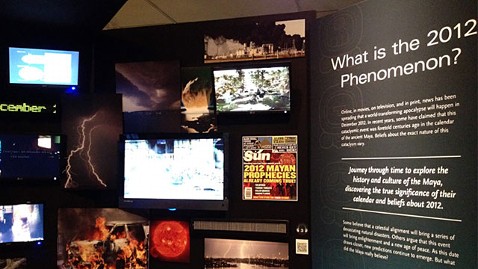Dec. 21, 2012: Why You Should Party Like It's 1999!
 (Image Credit: Tish Wells/MCT via Newscom)
(Image Credit: Tish Wells/MCT via Newscom) A quick online search of the terms, "December 21? and "Maya" could encourage an ugly marathon bender of spray cheese and the Game Show Network because according to some of the results, there's a chance Dec. 21, 2012, could mark the end of the world.
Depending on your penchant for semi-congealed cheddar and Richard Dawson, here's the good-bad news: the Maya never said anything about Dec. 21, 2012, being 'The End Of The World As We Know It.' REM was clearly whaling about something else, because there is no record or history that remotely resembles a doomsday prediction.
So, do you feel fine?
Before you consult WebMD about this feeling of confusion and redirect your spiritual guidance to a stack of scratch-0ff lottery tickets, you should know a few things about why this date does have significance to the Maya and what it could mean for your social calendar. The University of Pennsylvania's Penn Museum has a first-class exhibit that explores this oft-cited civilization, so we dug deep for information from Loa Traxler and Simon Martin, archeologists who helped create the museum's experience.
First, the Maya called the shots from 800 BCE until around 900 CE in most of southern Mexico to Honduras. Part of what made the civilization so powerful was a structured system of governance with multiple kingdoms that encouraged sustainable trade relations and emphasized scientific advances. Ever heard of Chichen Itza? Sipped a cup of Swiss Miss hot chocolate? Yup, both beautifully delicious creations, courtesy of Mayan ingenuity. But what's got everyone talking lately is their complex calendar.
According to Martin, the Maya developed a system of three interlocking wheels, like gears in a clock, to record time and events. Each of these wheels represents a different length of time, similar to the weeks, months and years that mark our solar calendar. As these gears move, marking specific dates, they turn closer and closer to their original starting position. But once they hit that position, the calendar simply doesn't stop recording; those big wheel(s) keep on turnin'. Which means, some dates will repeat. Enter the date Dec. 21, 2012.
What's so special about 12-21-12?
"This date occurred once before, more than five thousand years ago, and we know that it was a time when the Mayan gods were reordering the universe, a bit," Martin said.
Oh, that's it? The universe hits the "shuffle" button and we move on? Basically, yes.
Martin and Traxler are deliberate in describing what happened during the first go around with Dec. 21, 2012. While the buzz surrounding the Maya calendar has turned them into a couple rock stars, they're careful not to add to the confusion about the date, but rather separate truth from fiction in ancient recordings.
Traxler puts 12, 21, 2012, into a simple perspective:
"For us, a comparable would be the Y2K event, a tremendously important benchmark date. But just as for us, there was all of this hubbub and about what was going to happen at midnight of this new millennium."
It's not exactly the dire interpretation that we've been hearing about. Then again, Martin says, the Maya themselves might have started the buzz thousands of years ago:
"This year marks this particular completion point. But the problem is, the Maya only talk about it twice. In all the thousands of inscriptions, this year is mentioned only two times. And both times they kind of use it as an anchor point. They don't really tell us what's supposed to happen."
Still, it seems like a safe bet not to tell your spouse what you really think of your in-laws or max out your credit cards with the protection of an apocalyptic ending.
Instead, Traxler offers a forward-looking approach to 12, 21, 2012:
"It's like a New Year's celebration, people should look at it as an opening of a new period of time, and recognize the Maya culture and our own place in the global world."
So it looks like we're going to dodge a bullet this time around. But that shouldn't stop you from picking up that extra can of Easy Cheese. After all, Michael Stipe, you feel fine.